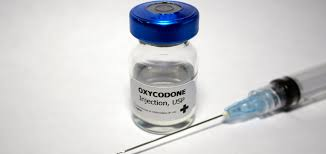Oxycodone Abuse Symptoms & Withdrawal
Immediate
Placement Available at our Top-Rated Treatment Centers.
Please call us at (855) 410-4488. We work
with most major insurance providers and offer flexible payment
options!
Atrium Addiction Care offers a variety of treatment choices and programs for individuals struggling with drug or alcohol addiction. Our inpatient treatment programs are designed for those who have more severe substance use problems and require 24-hour care. We admit both voluntary and involuntary patients.

Oxycodone is a powerful opioid painkiller that has been widely prescribed to treat moderate to severe pain. While it can be effective to treat pain when used as directed, the medication also poses a high risk for abuse and addiction. Unfortunately, many individuals who begin using oxycodone for legitimate medical reasons may find themselves struggling with dependence or addiction.
The symptoms of oxycodone abuse can vary depending on how much of the drug an individual is taking and the length of time they have been using it. Common signs of oxycontin addiction abuse include drowsiness, confusion, slowed breathing, nausea, and constipation.
Over time, repeated use of oxycodone can lead to physical dependence, meaning that the body requires increasing amounts of the drug in order to function normally. When someone attempts to stop using oxycodone after becoming dependent, they will likely experience withdrawal symptoms such as muscle aches, insomnia, anxiety, and cravings for the drug.
In this article from Atrium Addiction Care, we will explore more about Oxycodone Abuse Symptoms & Withdrawal and discuss treatment options available for those seeking help.
Understanding Oxycodone Addiction
Oxycodone addiction is a growing concern in society due to its high potential for abuse. The causes of oxycodone addiction are multifaceted, with both biological and environmental risk factors at play.
Genetic predisposition, chronic pain conditions, mental health disorders, and social influences all contribute to the development of an addiction. Individuals who abuse oxycodone face numerous risks including physical dependence drug addiction, tolerance, overdose, respiratory depression, and death.
ithdrawal symptoms such as anxiety, irritability, nausea, vomiting, diarrhea, muscle aches and insomnia can also occur when discontinuing use of the drug.
Effective treatment for oxycodone addiction involves a combination of medication-assisted therapy and behavioral interventions. Support from family members or loved ones is crucial during the recovery process.
Prevention efforts should focus on education about the dangers of prescription drug misuse. This includes educating patients on how to properly take their medications as well as providing alternative pain management options whenever possible.
Healthcare providers must also be vigilant in prescribing opioids and monitor their patients closely for signs of abuse or diversion. By addressing these issues head-on through prevention efforts that prioritize education over punishment we can help reduce the prevalence of oxycodone addiction in communities across America.
Recognizing Symptoms Of Abuse
Identifying the warning signs of opioid use disorder and oxycodone abuse is crucial to prompt intervention and treatment. Behavioral changes are often noticeable in individuals who develop an addiction to opioids, including oxycodone. Some common symptoms that may indicate substance abuse include increased irritability or mood swings, decreased motivation, withdrawal from social activities, and a lack of personal hygiene.
However, it's important to note that these behavioral changes can also be attributed to other factors such as depression or stress. Therefore, it's essential to look for additional physical health consequences associated with opioid abuse. These may include nausea and vomiting, constipation, respiratory issues, and unconsciousness. Additionally, opioid use and overdose risk increases significantly when mixing them with alcohol or other drugs.
If you suspect someone is struggling with oxycodone abuse, there are various options for intervention available. Professional help from addiction specialists can provide effective treatment plans tailored to individual needs.
Prevention strategies are equally important in addressing this public health concern. Educating people about the risks of prescription drug misuse and proper disposal methods can reduce exposure while promoting safe medication practices.
Symptoms:
- Warning Signs
- Increased irritability/mood swings
- Withdrawal from social activities
- Lack of personal hygiene.
- Health Consequences
- Nausea/vomiting
- Respiratory Issues
- Unconsciousness
- Intervention Options & Prevention Strategies:
- Professional Help (addiction specialists)
- Education About Risks Of Prescription Misuse
- Proper Disposal Methods - Proper Disposal Methods for Unused Prescription Medications (such as participating in drug take-back programs)
Physical And Psychological Withdrawal Symptoms
The physical and psychological withdrawal symptoms of oxycodone abuse can be daunting, but they are a necessary part of the medical detox process.
Many individuals will experience flu-like symptoms such as nausea, vomiting, diarrhea, muscle pain, and sweating during initial withdrawal periods. These painful symptoms may last for several days to a week.
Psychological withdrawal: symptoms of withdrawal can include anxiety, depression, irritability, mood swings, insomnia or fatigue.
To cope with these challenging symptoms effectively requires emotional support from medical professionals, loved ones or trained therapists who understand addiction recovery and mental health issues.
Medication-assisted treatment (MAT) is an effective approach that combines medication management with counseling services to help ease the transition into sobriety while reducing withdrawal symptoms.
Coping strategies like mindfulness meditation techniques have also been found helpful in curbing severe cravings and minimizing relapse risks.
In addition to traditional methods of substance abuse treatment approaches, holistic therapies have grown popular in recent years due to their ability to treat mind-body-spirit connections simultaneously.
Holistic treatments like acupuncture, massage therapy and yoga are believed to enhance relaxation and reduce stress levels making them excellent complementary options for managing withdrawal symptoms alongside conventional medicine.
Relapse prevention measures should always take center stage after completing detoxification programs by reinforcing healthy habits that maintain sobriety over time without relying on addictive substances or behaviors.
Seeking Professional Help

For those dealing with oxycodone addiction, seeking professional help is a crucial step towards recovery. Treatment options for this type of addiction range from outpatient therapy to inpatient rehabilitation programs. Regardless of the approach chosen, it is important that individuals receive treatment tailored to their specific needs and circumstances.
Therapy benefits are numerous when it comes to treating oxycodone addiction. Therapy sessions can help individuals identify underlying issues that may have contributed to their addiction and develop effective coping mechanisms. Additionally, support groups can provide a sense of community and shared experience, helping individuals feel less isolated in their struggle with addiction.
Relapse prevention strategies should be an integral part of any treatment plan for oxycodone addiction. Aftercare planning is also essential for maintaining sobriety after leaving a formal treatment program. Family involvement can play a significant role in both relapse prevention and aftercare planning by providing emotional support and accountability for the individual in recovery.
Overall, seeking professional help offers many benefits for those struggling with oxycodone addiction. From therapy options to support groups and aftercare planning, there are resources available to help individuals overcome this challenging condition. With dedication and commitment to treatment, lasting recovery is possible.
Personalized Treatment Plans At Atrium Addiction Care
Customized treatment plans are a key aspect of the recovery process at Atrium Addiction Care. The experienced staff members work with each individual to create an individualized plan that addresses their specific needs and goals. This ensures that every patient receives the level of care they require for a successful recovery.
The holistic approach utilized by Atrium Addiction Care takes into account all aspects of an individual's life, including physical, emotional, and spiritual well-being. Patients receive comprehensive care that includes therapy, medication management, and other evidence-based treatments. Additionally, patients benefit from a supportive environment where they can focus on their recovery without outside distractions or negative influences.
Atrium Addiction Care also offers aftercare services to support individuals in maintaining sobriety once they leave the facility. These services may include ongoing therapy, support groups, and access to community resources. Family involvement is encouraged throughout the treatment process as well. Loved ones play an important role in providing support and encouragement during this difficult time.
Our customized treatment plans give patients a sense of control over their recovery journey. With our experienced staff guiding them through the process, patients feel confident in achieving success. The supportive environment at Atrium Addiction Care fosters feelings of safety and security during such a vulnerable time.
Overall, Atrium Addiction Care provides personalized treatment plans designed to meet the unique needs of each patient. The combination of experienced staff, holistic approach, supportive environment, aftercare services, and family involvement creates an atmosphere conducive to lasting recovery.
Achieving Long-Term Recovery
- Developing healthy habits is essential in the process of achieving long-term recovery from oxycodone abuse and addiction.
- Establishing a support network of people who understand and provide encouragement is a key factor in maintaining sobriety.
- Positive self-talk, physical activity, and healthy nutrition can have a positive effect on individuals in recovery.
- Identifying triggers that lead to drug use is an important step in avoiding relapse.
- Developing strategies to manage triggers and develop coping skills can help to prevent relapse.
- Atrium Addiction Care pro vides a comprehensive program of recovery that focuses on developing healthy habits, building a support network, and identifying triggers.
Developing Healthy Habits
Oxycodone abuse can have serious consequences that may lead to addiction. Individuals who are suffering from oxycodone addiction require the right tools and strategies to achieve long-term recovery. Developing healthy habits is a critical factor in achieving this goal, as it helps individuals create new routines and goals for themselves.
Creating routines is an essential component of developing healthy habits. Establishing a routine can help individuals stay on track with their recovery goals by providing structure and stability in their day-to-day lives.
Setting achievable goals is another crucial aspect of establishing healthy habits. These goals should be specific, measurable, attainable, relevant, and time-bound (SMART). This will enable them to monitor their progress effectively.
Mindful practices such as meditation or yoga can also assist those recovering from oxycodone addiction. Mindfulness enables people to live in the present moment rather than dwelling on past mistakes or worrying about future uncertainties.
Self-care tips like getting enough sleep, eating healthily, exercising regularly, and taking breaks when needed are also important factors in promoting overall wellness during the recovery process.
Social support systems like peer groups or family members play a vital role in maintaining motivation throughout treatment programs; positive affirmations can encourage self-confidence and provide encouragement along the way.
Overall, developing healthy habits is an integral part of achieving long-term recovery from oxycodone addiction. Creating routines, setting SMART goals, practicing mindfulness techniques, engaging in self-care activities, tapping into social support networks and using positive affirmations all work together towards positively impacting the individual's journey toward full recovery without any relapse incidents along the way.
Building Support Networks

In addition to developing healthy habits, building support networks is also crucial in achieving long-term recovery from oxycodone addiction. Peer support groups can provide a safe space for individuals to share their experiences of pain relief and struggles with others who have gone through similar situations.
Family involvement can also be beneficial in providing emotional and practical support during the recovery process. Therapy options such as cognitive-behavioral therapy (CBT) or dialectical behavior therapy (DBT) are evidence-based treatments that help individuals learn coping skills and strategies to manage cravings and triggers associated with substance abuse.
Holistic approaches like acupuncture, massage therapy, or art therapy may complement traditional therapies by addressing physical and mental health concerns. Online resources such as virtual support groups or online forums can supplement face-to-face interactions if accessibility is an issue.
Community outreach programs like public awareness campaigns or volunteer opportunities enable individuals to give back while connecting with others who are passionate about helping those struggling with addiction. Overall, building a strong support network is essential in maintaining motivation and promoting overall wellness during the recovery journey.
Incorporating peer support, family involvement, accessing various therapeutic modalities both traditional and holistic practices, utilizing online resources when needed, and engaging in community outreach create a sense of belongingness which positively impacts one's road towards full recovery without any relapse incidents along the way.
Identifying Triggers
Achieving long-term recovery from oxycodone addiction requires identifying common triggers that may lead to relapse. Triggers can be internal or external factors that induce cravings, such as stress, negative emotions, social situations, or environmental cues associated with drug use. It is crucial for individuals in recovery to develop coping mechanisms and strategies to avoid relapse when faced with these triggers.
Support systems play a significant role in helping individuals identify and manage their triggers. Therapists can provide guidance on recognizing and addressing trigger-related thoughts and behaviors through evidence-based treatments like CBT or DBT. Peer support groups offer opportunities for sharing experiences and learning from others who have dealt with similar struggles. Family involvement provides emotional support during difficult times.
Self-care practices are also essential in managing triggers and preventing relapse. Engaging in activities that promote physical health, such as exercise or yoga, can reduce stress levels and improve overall well-being. Practicing mindfulness meditation or journaling can help individuals become more aware of their thoughts and feelings related to addiction and develop healthier ways of thinking about them.
In conclusion, identifying triggers is an important step towards achieving long-term recovery from oxycodone addiction. Coping mechanisms, avoiding relapse, support systems, therapy options, and self-care practices are all valuable tools for managing triggers effectively. With the right combination of resources and strategies tailored to individual needs, it is possible to maintain sobriety while building a fulfilling life beyond addiction.
Conclusion
Oxycodone addiction is a serious problem that affects many individuals. Recognizing the symptoms of abuse and understanding the physical and psychological withdrawal signs and symptoms can help individuals seek professional help to achieve long-term recovery.
At Atrium Addiction Care, personalized treatment plans are available for those struggling with oxycodone addiction. With the guidance of experienced professionals, patients can overcome their addiction and avoid relapse.
It is important for those struggling with oxycodone addiction to seek professional help and take steps towards achieving a healthier, drug-free life.
